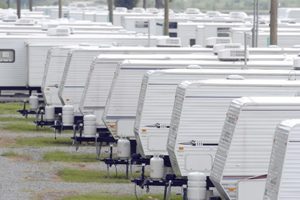
Lawsuits Against FEMA Is Possible. Although U.S. District Judge Kurt Engelhardt refused to grant class-action status to the hundreds of toxic FEMA (Federal Emergency Management Association) trailer lawsuits, he did rule the cases must be presented on a case-by-case basis, reported the Washington Post. The judge also rule that FEMA was no immune from the lawsuits. […]

Lawsuits Against FEMA Is Possible. Although U.S. District Judge Kurt Engelhardt refused to grant class-action status to the hundreds of toxic FEMA (Federal Emergency Management Association) trailer lawsuits, he did rule the cases must be presented on a case-by-case basis, reported the Washington Post. The judge also rule that FEMA was no immune from the lawsuits.
The lawsuits claim that Hurricane Katrina and Rita victims were exposed to potentially toxic fumes while living in the Toxic FEMA trailers, said CBS News. Attorneys representing plaintiffs in the suit claim trailer makers used substandard “products and methods,” reports The Washington Post.
Last year, it was discovered that the toxic FEMA trailers were emitting far more poisonous formaldehyde than first believed and, according to air quality test conducted by the Sierra Club, as many as 95 percent of occupied Toxic FEMA trailers used by Rita and Katrina hurricane victims contained twice the level of formaldehyde fumes considered safe by the Centers for Disease Control and Prevention (CDC). What’s more, the same air quality testing found unsafe levels of formaldehyde in FEMA mobile homes, which were once thought to be a safe alternative to the Toxic FEMA trailers.
Although plaintiffs’ attorneys argued that a class-action suit would best resolve the multi-state cases, The Washington Post reports Engelhardt ruled that because the lawsuits name hundreds of different types of trailers manufactured by a variety of companies, and involve numerous people with differing and various medical histories and complaints, the cases must be handled individually. “Each plaintiffs’ claims and alleged injuries will require an examination of individual evidence,” Engelhardt wrote in a nearly 50-page ruling, said CBS News.
After Hurricane Katrina, FEMA purchased nearly 2,000 travel trailers at a cost of $2.6 billion. Some residents lived for months for their trailers only to discover the cheap building materials used were emitting toxic formaldehyde vapors. The lungs of young children can be extremely damaged from these toxic vapors and many people reported not being able to stay in their trailers for more than five minutes without experiencing burning eyes, coughing, headaches, nausea or skin rashes, sinus infections, and nosebleeds. Formaldehyde is also a known carcinogen.
CBS News said its chief investigative correspondent spoke with employees on trailer production lines who knew about the formaldehyde problem. “We were instructed to open the doors and windows so that the odor wouldn’t be as strong when the “FEMA” inspectors got there,” one worker told CBS. CBS also said the CDC tested air quality in hundreds of the Toxic FEMA trailers and found formaldehyde levels were about five times higher than what is in most “modern” homes.
In his ruling, Engelhardt referred to evidence that revealed “FEMA” delayed its investigation over concerns of legal culpability, noting that FEMA knew of the problem sometime around March 2006. But according to the Associated Press, Engelhardt’s ruling said,, FEMA stuck “their heads in the sand” and did not order testing on air quality. “Indeed, the evidence shows that “FEMA” initially ignored the potential formaldehyde problem and neglected to conduct testing in fear that such testing would imply FEMA’s ownership of the issue,” his decision said.
The personal injury attorneys at Parker Waichman LLP offer free, no-obligation case evaluations. For more information, fill out our online contact form or call 1-800-YOURLAWYER (1-800-968-7529).


